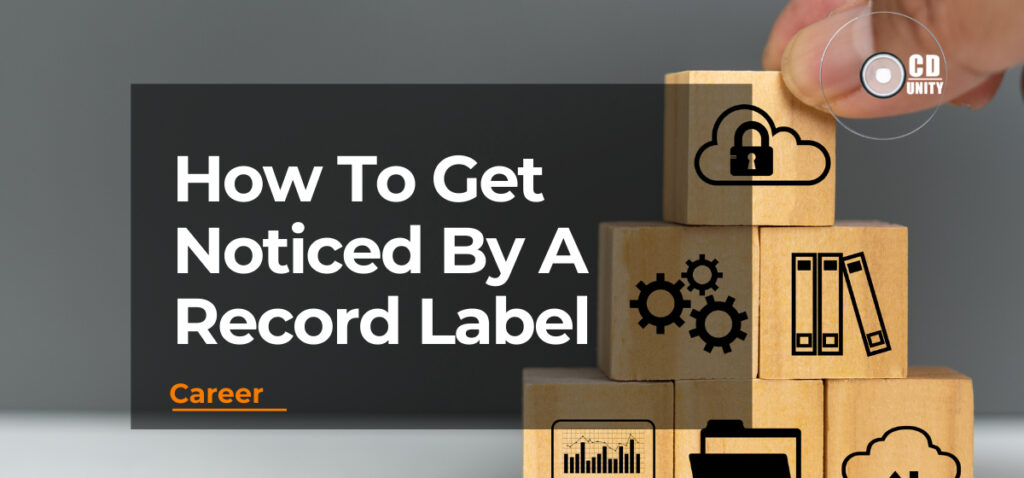
Getting Noticed by a record Label
If you don’t have a good manager, attaining a record deal may have seemed like an impossible dream in the past, but with determination and good music, it is possible to get noticed by established record labels.
In this blog post, I’ll discuss practical tips for how musicians can make themselves stand out from the competition and put themselves on the radar of major labels.
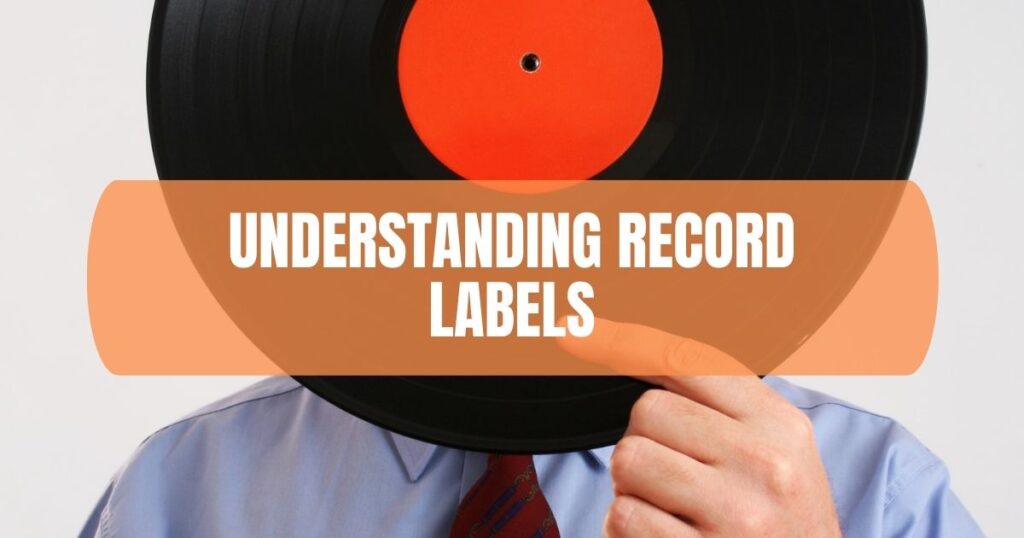
Understanding The Music Industry And Record Labels
Gaining a thorough understanding of the current trends in the music industry and how record labels work is vital for increasing your chances of getting noticed.
The Role Of Record Labels
Being signed to a record label is an important milestone for any musician.
Record labels can provide the support and resources necessary for music careers to take off, helping artists launch their projects more effectively and reach larger audiences.
Record labels are companies that manufacture, distribute, and promote recordings of affiliated musicians – they act as an investment bank by investing in recordings, style, video content and tours of their respective artists.
Label contracts also give them the right to sell or even license tracks from singers & musicians, making both artists and labels profits in return; this means providing exclusive deals depending on how lucrative it could be for both parties involved.
The Current State Of The Music Industry
The music industry has changed dramatically over the last few decades, with digital streaming and distribution playing a huge role in reshaping how musicians get discovered and make money.
Artist management and branding are seen as key parts of building an independent career in music.
Musicians can now make use of platforms like YouTube, Soundcloud or Bandcamp to distribute their music quickly, any many often decide not to sign with major labels and manage their own careers directly instead.
What Record Labels Look For In Artists
First and foremost is the creative vision – does their sound and style stand out from the crowd?
A&Rs (Artists & Repertoire) will listen to demos from many different musicians, so it’s vital that your songs make a strong first impression.
This doesn’t necessarily mean compromising your unique identity either – there are plenty of successful artists who haven’t been afraid to push boundaries while staying true to themselves.
Besides creativity, labels also consider commercial appeal when signing an artist: Does the music have enough potential for radio play or streaming success?
This can depend heavily on production quality, so investing in quality recordings and mastering with experienced producers would be beneficial if you want to stand out from other unsigned acts.
Having some existing fan base is another key element when being considered by a label.
The Importance Of Standing Out
The music industry today is an incredibly competitive place, and artists need to do more than just create great music in order to stand apart from the crowd.
To make yourself noticeable amongst endless options, it is essential that you define your brand and showcase a unique sound, style or message.
You should also aim to develop a strong online presence which showcases exactly who you are as an artist; this includes having cohesive visuals for your public profiles and sharing thoughtfully crafted content regularly on social media platforms that bind together all facets of your artistic persona.
Take inspiration from some of history’s most successful recording artists:
Lady Gaga developed her theatrical stage performances – as well as soon-to-be iconic fashion statements;
Chance the Rapper found success through independent releases made exclusively via streaming platforms such as SoundCloud;
Rihanna used multiple paths (records labels, movie deals etc.) at once while still maintaining her distinctive look ad sound.

Building Your Brand And Music Career
At every stage of your music career, it is essential to establish a strong brand and presence to get you noticed by the right record labels.
Building A Strong Online Presence
Having an impressive, consistent online presence is essential in the music industry if you want to get signed by a record label.
Everything from your social media accounts and website design to your content creation will be taken into consideration when looking for artists.
Social media plays a huge role in building your online brand.
Make sure each of your profiles is easily identifiable under one name; this helps create consistency with followers who can quickly recognise and engage with you or your music across different platforms.
Your posts should show personality without detracting from the professionalism of being an artist, so don’t just post about irrelevant things – keep it focused on what drives people’s engagement towards you (e.g., release news or upcoming gigs).
Collaborating With Other Artists
Collaborating with other artists is an incredibly powerful tool in the music industry that can help you stand out and get noticed by record labels.
By working with other talented individuals, you create more entertaining content and have increased exposure to a larger audience.
This can lead to more opportunities, including potentially being noticed by record labels who are looking for fresh new ideas from upcoming independent musicians.
To maximise chances of getting signed, networking within the community is key; go above and beyond just music-making activities by attending events or maintaining relationships with those associated with the industry professionally (such as producers).
Enhancing Live Performances
A strong stage presence can draw the attention of record labels as it shows your commitment and professionalism as an artist.
Engaging with the audience through positive energy, movement, and charisma will make your live performances memorable and valuable for both you and potential fans in attendance.
Before each show, it’s important to prepare yourself fully so you can perform at your best.
Rehearse regularly to polish up on any rough edges that could hold back your performance, create setlists to help maintain the flow throughout the show, and think of ways you could incorporate visuals or props into the mix which could further engage the audience.
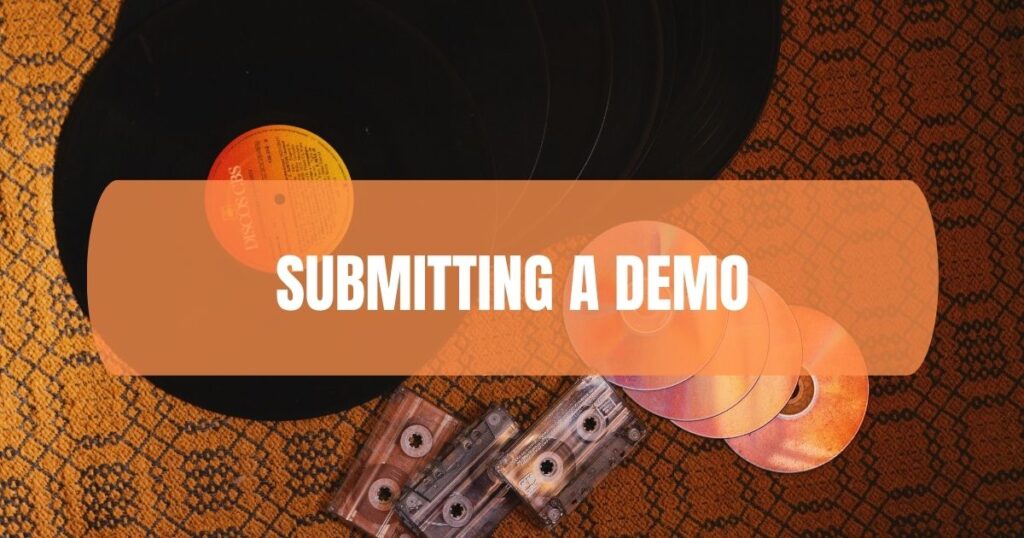
Creating And Submitting A Professional Demo And Press Kit
Writing a professional demo and press kit is key to getting noticed by record labels, as these tools help to make a great first impression.
Investing In Quality Recordings
When you’re serious about getting your music noticed, investing in quality recordings and production is essential.
Your goal should be to present the best possible representation of yourself as an artist – one that stands out above the rest.
This means spending time and money finding the right recording studio and audio professionals who can craft unique sounds that capture your musical vision.
Showcasing Your Best Work
It’s not enough just to have good music; you need to present it well in order to stand out from other musicians.
High-quality recordings are a must – they should be reflective of the kind of sound you want to create and show off what sets you apart as an artist.
It’s not only about the audio either – visuals are important too.
Make sure any artwork accompanying the release looks professional and unique, just like the rest of your work!
Once everything’s ready, press CDs and send them out to the labels.
Making A Strong First Impression
Making a strong first impression is essential when aspiring to get noticed by record labels.
Investing in quality recordings and showcasing your best work is key, as it’s the sound that will initially draw attention.
Accompany these recordings with a brief introduction about yourself and why this track should be considered; providing simple facts such as genre type and influences can help here.
When taking strides toward getting your demo heard by record labels, know that social media activity impacts their interest as well– staying active on platforms like Instagram, YouTube, and Twitter keeps venues up-to-date about what you’re working on or where you may perform next.
Developing A Professional Press Kit
A professional press kit is essential for independent musicians looking to get noticed by major record labels.
It should represent the artist’s brand and identity, containing everything someone may need to learn more about them, including an artist bio and high-quality photos.
An Electronic Press Kit (EPK) is also a great way to introduce your music and story to people in the industry.
To make sure your EPK stands out, including key elements such as samples of your sound, media quotations or reviews you’ve received, contact information, any awards won or milestones achieved – anything that showcases how dedicated you are to your craft!
Above all else, make sure it’s well-crafted with tidbits of information that will help you project yourself better within the industry while giving off a vibe of professionalism.

Networking And Making Connections
By attending industry events and building relationships with label professionals, you can increase your chances of being noticed by a record label.
Attending Industry Events
Attending industry events is an important component of furthering a musician’s career.
Networking and building mutually beneficial relationships with others in the music industry are key if you want to get noticed and take your career to the next level.
By turning up on time and being respectful and well-rehearsed at these events, artists can show their professionalism and stand out from the crowd.
Getting to know venue owners & event organisers is another great way of securing gigs & getting introduced to other so-called ‘influencers’ within the scene that could potentially help advance artists’ careers further.
The goal should be broadening one’s professional support network by providing mutual benefits, which will inevitably lead to increased exposure both online on social networks like Spotify but also offline at live music venues around town when the gigging season begins!
Building Relationships With Industry Professionals
As a musician, one of the most important things you can do in order to get noticed by an influential record label and move your career forward is to build relationships with industry professionals.
This means connecting with people from various branches of the music industry, such as producers, promoters, managers, etc., who have connections and access that you may not.
Networking is key when it comes to building professional music industry contacts—actively engaging on social media platforms (e.g., Twitter), and conducting research online or offline about labels or other organisations relevant to your genre of music are all great ways to start reaching out and making connections.
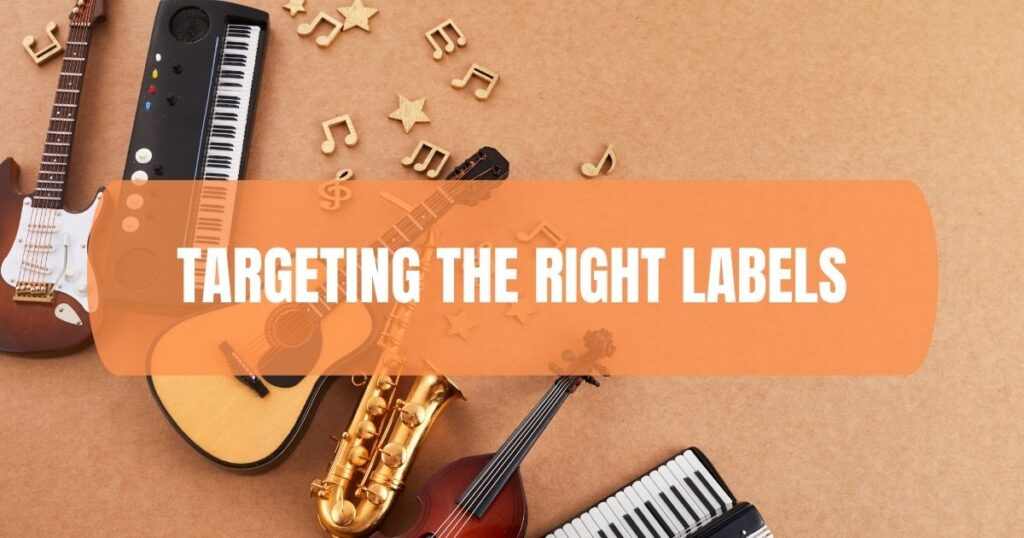
Researching And Targeting The Right Labels
Take your time to research labels, understand what they value, and tailor your demo accordingly – only then will you be one step closer to potential recognition.
Identifying Labels That Fit Your Genre
When it comes to finding a record label, targeting independent companies may be more successful than major labels due to their often less restrictive terms and conditions, which allow for more creative freedom.
When researching potential targets, look into their values and goals, as they should match up with yours if you want a long-lasting relationship with them.
Understanding The Label's Values And Goals
Aligning with a label’s values and goals can also benefit an artist’s career; Take Stones Throw Records – founded by DJ Peanut Butter Wolf in 1996 since its inception has focused on championing creative expression while showcasing diverse genres like hip-hop, indie rock and soul from over 500 artists across the globe.
Having examples such as these have shone a light on how researching record labels before pitching a project is key – remembering that each will have different functions you could utilise within your music business strategy.
Tailor Your Approach
By understanding the types of music labels are looking for and what makes them stand out from other labels, you can tailor your approach accordingly.
Understanding how prior artists have been marketed through their services may offer further insights on how best to target them when submitting demos or reaching out for collaborations.
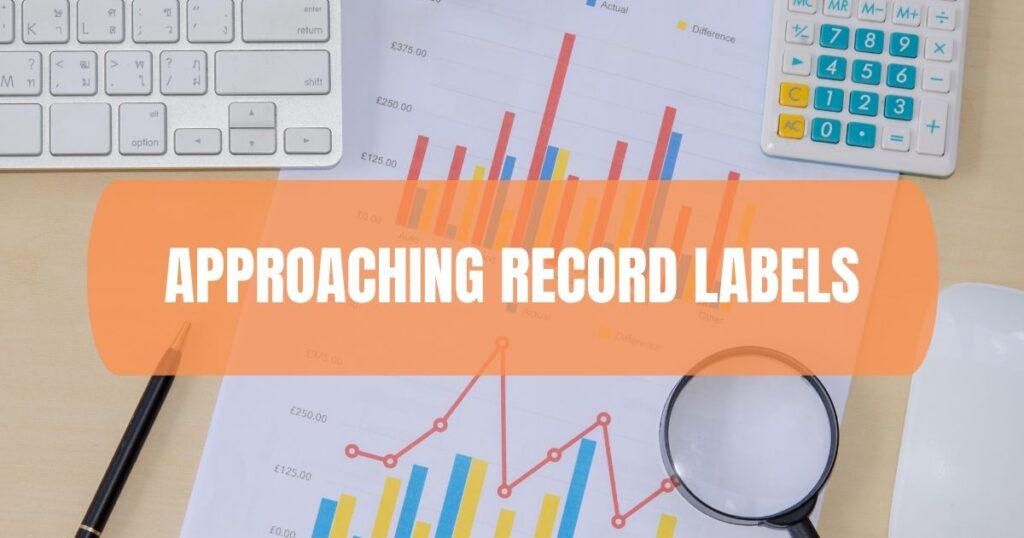
Approaching Record Labels
Submitting your demo and press kit, following up strategically and maintaining professionalism are essential aspects of getting noticed by a record label.
Submitting Your Demo And Press Kit
When it comes to submitting your demo, showcasing your best work should be a top priority; make sure not to include copyrighted material or cover songs.
To increase the impact of your submission, develop a professional press kit —this usually consists of headshots, biographies, videos/audio clips, press releases and reviews from other media sources.
Following Up Strategically
When submitting your demo and press kit to a record label, it is important to know when and how to follow up.
If done properly, following up strategically can demonstrate that you are professional, persistent and ambitious.
After initially making contact with a record label, it’s useful to briefly outline what you think you can offer them, i.e., why have you contacted that particular label?
This should be accompanied by marketing ideas for your project/album, plus any other content which helps demonstrate successful plans for getting music out there into the world.
Depending on the response from the label (if there was one), follow-up emails should begin around four weeks later.
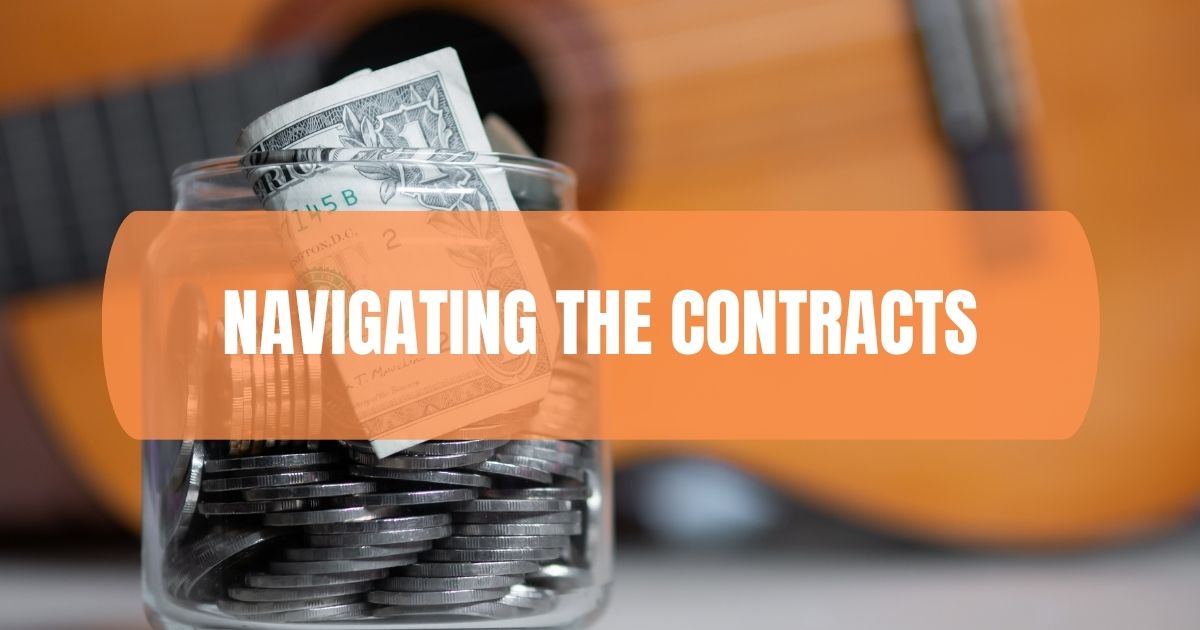
Navigating The Contract Process
It is essential to understand the terms and conditions of a record label contract before signing, so it is important to seek and negotiate legal advice where necessary.
Understanding The Terms And Conditions Of A Record Label Contract
A key point for artists to be aware of is that royalty percentage can greatly vary from one contract to another.
It pays off in the long run for musicians to take their time and research any royalties that may be included in their agreement with the label.
Be sure to negotiate what seems fair when it comes down to it.
Additionally, exclusivity agreements mean an artist cannot sign or work with other labels until they have fulfilled all recordings assigned under said contract.
Contracts can also contain hidden clauses that do not benefit artists, so make sure you read everything thoroughly.
Seeking Legal Advice
Having experienced legal representation can help ensure that the contractual obligations between the artist and label are fair for both parties involved, allowing them to operate on equal footing.
Signing without paying attention to clauses can be catastrophic.
To avoid this, lawyers can review music industry contracts thoroughly and advise you on issues regarding copyright law, royalty splitting policies, restrictive covenants and production costs, ensuring all commitments provided by both parties are clearly stated with clarity.
Negotiating Terms And Conditions
This is an important step for any musician as it determines the specifics of how your work will be published and managed.
It’s essential to understand exactly what you’re signing up for when dealing with contracts from record labels.
All in All
In conclusion, the best way for musicians to get noticed by record labels is to put in the hard work and dedication needed to refine their sound and build a strong professional image.
The key is also finding the right record label that resonates with your music style and genre.
Be patient and consistent. You can do it.
I believe in you.
Cheers, Josh
Browse our CD duplication products
The Big Lists Of Music Promo Contacts
Includes PR companies, UK promoters & UK booking agents. Everything you need to put your band on the map.
Access ListsHello, I’m Josh, and I’ve been honing my graphic design skills for almost 15 years now, catering to the needs of bands and businesses alike. What really fascinates me is the business aspect of the music industry. In addition to my design work, I also happen to play the Hammond organ, and I strive to share my knowledge through helpful articles that I write exclusively for you all!


